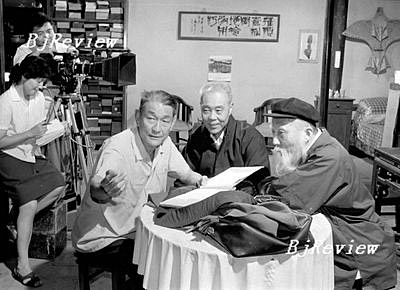
A group of students deadlocked over how to stage a play about Chinese actors a hundred years ago, pondered the ideas of three different directors, and ended up lost in the essence of drama. That is the story told in Xunzhao Chunliushe, or Finding The Spring Willow Drama Club, a play staged recently to mark the centennial birthday of Chinese modern drama, which "originated from the West, but has developed into something with vigorous Chinese characteristics," according to Wang Weiguo, a researcher on the art form.
"Today we put on this play to pay tribute to the ancestors of Chinese drama and to continue reflection on its future," said the play's director Ren Ming, who gave it an ending where instead of giving up on the play, the students carried on pursuing an answer.
Early stages
The Spring Willow Drama Club, which was started in 1906 by Chinese students studying in Japan, is considered as the founder of Chinese modern drama. The original group acted as well as performing music and poems and its members included Li Shutong, one of the pioneers of Chinese painting, modern music and arts education.
In Tokyo, in 1907, the club put on a trial performance of the third act of the classic The Lady of the Camellias, in which Li played the role of the lady. This performance is considered the first drama performed by Chinese in the Chinese language.
The club premiered a five-act play based on the novel Uncle Tom's Cabin, and established an unprecedented form of drama in China: the first drama script and the first complete drama performance.
The advent of modern drama in China contrasted with traditional Chinese drama which was divorced from reality, by reflecting social reforms and issues that the public cared about, according to Professor Ding Nan from Shanghai Theater Academy.
Modern Chinese drama was born in a tough time when China's old and stumbling feudal society was collapsing and a new one was not yet built. Many young Chinese intellectuals were endeavoring to create a new culture with the help of Western ideas. Hence modern drama was employed as a weapon to express their political and social demands.
Echoing the Spring Willow Drama Club, which was Japan-influenced and actively performed in Shanghai, a school-based drama club in north China's Nankai University in Tianjin began to gain influence. The club was led by the president of the university Zhang Boling and performed 50 plays between 1908 and 1922.
Entering the 1920s, Tian Han, lyric writer of the national anthem of the People's Republic of China, began to establish the Nanguo Drama Club, the most professional drama club at that time, in the hope of starting an art revolution. Tian remained the leader of the drama movement during 1930s and 1960s, bringing theater to the public.
Tian's contemporary Hong Shen was the first Chinese citizen to major in drama at Harvard University in 1919. Hong established a drama director system and was known for his strict rehearsals. He established drama through dialogues as distinguished from opera and dance, and gave the name huaju to modern theater performed in China. Huaju literally translates as dialogue play.
